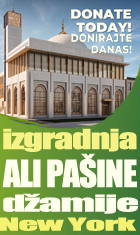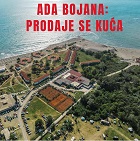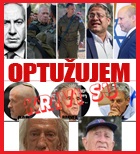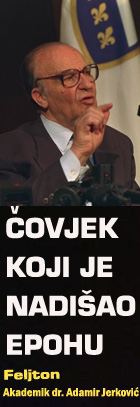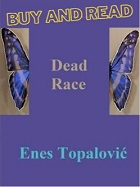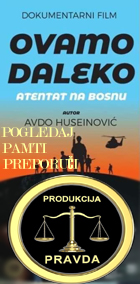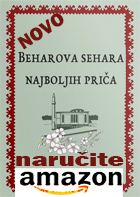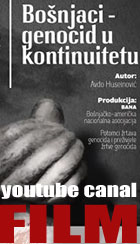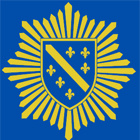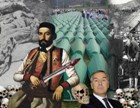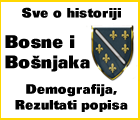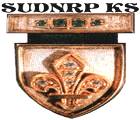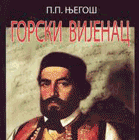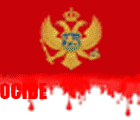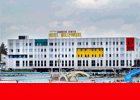
Komentari

"The role of Alija Izetbegović in the independence of Bosnia and Herzegovina": Serbian barkadas in Sarajevo, 1992.
WAR (4)
Adamir Jerković (Adamir Yerkovich) PhD is a Bosnian-Herzegovinian academic. He is the author of numerous political commentaries. He served as an advisor to the first President of Bosnia and Herzegovina, Alija Izetbegović. He held important political, state and economic posts. Adamir Jerković is the Secretary General of the Bosniak Academy of Sciences and Arts. He is the author of numerous books, essays, and articles.
The state known to millions of people around the world as Socialist Federative Republic of Yugoslavia – does not exist anymore. Yugoslavia burned out in a terrible fire which no one could have extinguished. On its ground, at the ashes of common state, seven new countries emerged. Among them is Bosnia and Herzegovina which revived its statehood. I am coming from Bosnia and Herzegovina and I will tell you today about difficult faith of my people who survived an exterminating war.WAR (4): Slobodan Milošević was clear that he was slowly losing Bosnia and Herzegovina, so already in the following few days Serbian barricades appeared in the streets of Sarajevo, and referendum and the killing of Serbian wedding guest in the streets of Sarajevo served as a justification of their coming out to the streets. But, in fact, that was a prepared military concept of resolution of Bosnian drama. [1]
Citizens of Bosnia and Herzegovina went out to the streets, aware that the war they wanted to stop came to their country. Everywhere paroles could be heard: “Bosnia, Bosnia”. But that did not stop Milosevic’s war preparations. Serbs in the first days of the New Year started with political shaping of Bosnia and Herzegovina. They were predominant in weapons and where they ruled they announced the Republic of Serbian people with the aim to annex it to Serbia.
Already on April 6, 1992, the European Union recognized Bosnia and Herzegovina as sovereign state. For Milošević there was no doubt that Bosnia and Herzegovina torn away and that there was no possibility of peaceful annexation to rump Yugoslavia. In Bosnia and Herzegovina was on fire, and during peaceful demonstrations in Sarajevo, Serb snipers shot on people and killed a student Suada Dilberović.
 Sarajevo 1992. |
From that moment until November 1995, Serbs held the capital city Sarajevo under the siege for 1335 days. Sarajevo was turned in the biggest concentration camp in the world where Serbs killed several thousands of its citizens (15.000), and among them more than 1600 children. The city was without electricity and water and it mostly depended on international convoys with food, or humanitarian aid. Serbs ruled throughout wide area of Bosnia and Herzegovina and committed horrible reprisals. Shootings and mass execution of Bosniaks civilians were constant. Destructions were mass in nature. Although under attack, Bosnia and Herzegovina, as a member of the United Nations, stayed without legitimate protection and the world decided to introduce arms embargo. In this was advantage was given to Serbs, who had significantly more arms in storages of Yugoslavian army. Don’t forget that so called Yugoslavian People’s Army was the fourth military force in Europe who openly sided with Serbs.
In his speech in the General Assembly of the United Nations on September 23, 1992, president Alija Izetbegović said about the imposed embargo:
„International community cannot simultaneously take steps which show intention to defend us and deny us the means for self-defense. If it becomes clear that nobody decisively tried to help us, we need to have incontestable right self-defense. The current arms embargo ties our hands at the time when our country is being suffocated. Embargo deprives us the only efficient means of defense. By acting in this manner, the assistance is given to our aggressor. Arms embargo for Bosnia and Herzegovina must be abolished.”
Members of Yugoslavian army were recruited to the Serbian army, and they only changed the markings on their hats. A great number of civilians were imprisoned in Serb concentration camps, and many of them never lived to see the freedom. It is estimated that by the end of 1992, i.e. during the first year of war, more than 100 thousand people were killed.
FOOTNOTE:
1] Slobodan Milošević, Serbian nationalist politician and president of Serbia (1989–97). He joined the Communist Party at age 18 and later became head of the state-owned gas company and president of a major Belgrade bank. Advised by his wife, a communist ideologue, he became head of the League of Communists in Belgrade (1984) and later in Serbia (1987). He replaced party leaders with his supporters, and in 1989 the Serbian assembly named him president of the republic. He maintained his power by repression and control of the mass media. He abrogated the constitutional autonomy of the Albanian province of Kosovo in 1989, which contributed to the secessionist movements in Slovenia, Croatia, and Macedonia and the breakup of Yugoslavia in 1991. He then supported Serbian militias fighting Muslims in Bosnia and Croatia but later signed a peace agreement in Dayton (1995) on behalf of the Bosnian Serbs. In 1999, after pro-independence insurgents began killing Serbian police and politicians, he retaliated with ruthless attacks on the province. NATO responded with a massive bombing campaign of Serbian targets. The subsequent ethnic cleansing of the province by troops under Milošević’s command drove hundreds of thousands of Albanian Kosovars to other countries as refugees and earned him worldwide loathing as a war criminal. In 2000 he was defeated in national elections. The following year he was arrested and extradited to the Netherlands to stand trial for genocide, war crimes, and crimes against humanity. The trial began in February 2002 but was frequently delayed because of Milošević’s poor health. On March 11, 2006, he was found dead in his prison cell.
Dossier: THE ROLE OF ALIJA IZETBEGOVIĆ IN THE INDEPENDENCE OF BOSNIA AND HERZEGOVINA
» ALIJA IZETBEGOVIĆ WAS ANTIPODE TO MACHIAVELLI (10)
Akademik prof. dr. Adamir Jerković | 19.08.2023 19:23
Akademik prof. dr. Adamir Jerković | 19.08.2023 19:23
» A MYTHICAL HERO FROM A BLOODY EPOPEE FROM THE END OF 20TH CENTURY (8)
Akademik prof. dr. Adamir Jerković | 08.08.2023 19:23
Akademik prof. dr. Adamir Jerković | 08.08.2023 19:23
» TUĐMAN DID NOT HIDE THAT HE WANTED TO SHARE BOSNIA AND HERZEGOVINA (5)
Akademik prof. dr. Adamir Jerković | 22.07.2023 17:17
Akademik prof. dr. Adamir Jerković | 22.07.2023 17:17
» WE SWEAR BY GREAT GOD THAT WE WILL NOT BE SLAVES (3)
Akademik prof. dr. Adamir Jerković | 16.07.2023 15:55
Akademik prof. dr. Adamir Jerković | 16.07.2023 15:55
» THE ROLE OF ALIJA IZETBEGOVIĆ IN THE INDEPENDENCE OF BOSNIA AND HERZEGOVINA (1)
Akademik prof. dr. Adamir Jerković | 13.07.2023 03:35
Akademik prof. dr. Adamir Jerković | 13.07.2023 03:35



